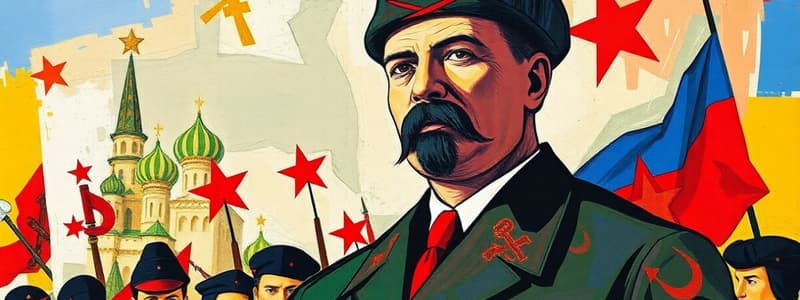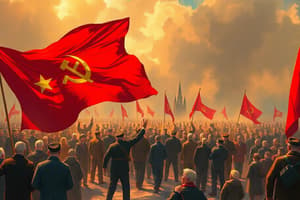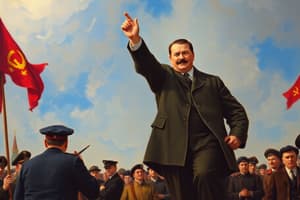Podcast
Questions and Answers
Which event directly preceded and fueled the transition from the Russian Empire to the Soviet Union?
Which event directly preceded and fueled the transition from the Russian Empire to the Soviet Union?
- The 1917 Russian Revolution and subsequent civil war. (correct)
- The era of Welfare Capitalism.
- The implementation of the New Economic Policy (NEP).
- The rise of the Flapper culture.
The New Economic Policy (NEP) in Soviet Russia completely eliminated all aspects of market-oriented activity and private enterprise.
The New Economic Policy (NEP) in Soviet Russia completely eliminated all aspects of market-oriented activity and private enterprise.
False (B)
What was the primary goal of the New Economic Policy (NEP) when it was introduced in Russia?
What was the primary goal of the New Economic Policy (NEP) when it was introduced in Russia?
To stabilize the Soviet Union and regain peasant support.
Which of the following best describes the social transformations occurring in Russia during the 1920s?
Which of the following best describes the social transformations occurring in Russia during the 1920s?
Urban areas during the 1920s generally experienced slower modernization and less technological advancement compared to rural areas.
Urban areas during the 1920s generally experienced slower modernization and less technological advancement compared to rural areas.
The vibrant African American artistic and cultural movement that flourished in New York City during the 1920s and 1930s is known as the ______.
The vibrant African American artistic and cultural movement that flourished in New York City during the 1920s and 1930s is known as the ______.
Which aspect of American culture saw a major surge in popularity during the 1920s, partly fueled by the growth of radio?
Which aspect of American culture saw a major surge in popularity during the 1920s, partly fueled by the growth of radio?
Flapper culture represented a continuation of traditional gender roles and expectations for women.
Flapper culture represented a continuation of traditional gender roles and expectations for women.
What societal shift is represented by the Jazz Age?
What societal shift is represented by the Jazz Age?
What is the definition of Isolationism?
What is the definition of Isolationism?
Welfare capitalism is an economic system where the means of production are owned and controlled by the government.
Welfare capitalism is an economic system where the means of production are owned and controlled by the government.
How does collectivism prioritize the community?
How does collectivism prioritize the community?
Which economic system is defined by private individuals and businesses owning property and the means of production?
Which economic system is defined by private individuals and businesses owning property and the means of production?
Individualism stresses the importance of prioritizing community needs above personal desires and uniqueness.
Individualism stresses the importance of prioritizing community needs above personal desires and uniqueness.
Define tariffs.
Define tariffs.
What is nationalism?
What is nationalism?
Anti-Semitism refers to prejudice and hostility toward all minority groups in society.
Anti-Semitism refers to prejudice and hostility toward all minority groups in society.
What characterizes totalitarianism as a political system?
What characterizes totalitarianism as a political system?
Which ideology advocates for a classless society where property is owned publicly?
Which ideology advocates for a classless society where property is owned publicly?
Imperialism involves a policy of non-interference in other countries' affairs.
Imperialism involves a policy of non-interference in other countries' affairs.
Flashcards
Transition to the Soviet Union
Transition to the Soviet Union
Transformation from the Russian Empire, fueled by the 1917 Revolution, led by Bolsheviks under Vladimir Lenin.
Russian New Economic Policy (NEP)
Russian New Economic Policy (NEP)
Introduced by Vladimir Lenin in 1921 to alleviate economic devastation and social unrest from War Communism.
Russia Changing Socially in the 1920s
Russia Changing Socially in the 1920s
Russia experienced social transformation, abolition of monarchy and the implementation of the New Economic Policy (NEP).
Urban vs Rural Divide - Cultural Changes
Urban vs Rural Divide - Cultural Changes
Signup and view all the flashcards
Harlem Renaissance
Harlem Renaissance
Signup and view all the flashcards
Flapper Culture
Flapper Culture
Signup and view all the flashcards
Jazz Age
Jazz Age
Signup and view all the flashcards
Isolationism
Isolationism
Signup and view all the flashcards
Welfare Capitalism
Welfare Capitalism
Signup and view all the flashcards
Collectivism
Collectivism
Signup and view all the flashcards
Capitalism
Capitalism
Signup and view all the flashcards
Liberalism
Liberalism
Signup and view all the flashcards
Individualism
Individualism
Signup and view all the flashcards
Tariffs
Tariffs
Signup and view all the flashcards
Nationalism
Nationalism
Signup and view all the flashcards
Anti-Semitism
Anti-Semitism
Signup and view all the flashcards
Totalitarianism
Totalitarianism
Signup and view all the flashcards
Communism
Communism
Signup and view all the flashcards
Imperialism
Imperialism
Signup and view all the flashcards
Fascism
Fascism
Signup and view all the flashcards
Study Notes
- The glossary history covers various terms and events from the early 20th century, focusing on political, economic, and cultural shifts
Transition to the Soviet Union
- The transition from the Russian Empire to the Soviet Union involved a radical transformation.
- This transformation was fueled by the 1917 Russian Revolution and subsequent civil war.
- Vladimir Lenin and the Bolsheviks seized power, establishing a socialist state known as Soviet Russia (1917-1922).
- The Soviet Union was officially formed in 1922 and lasted until 1991.
- The new state involved the establishment of four socialist republics and further additions, controlled by the Communist Party.
Russian New Economic Policy (NEP)
- Vladimir Lenin introduced the New Economic Policy (NEP) in 1921, in response to economic devastation and social unrest.
- War Communism's harsh policies necessitated this change.
- The NEP was a temporary shift toward a more market-oriented economy to stabilize the Soviet Union and regain peasant support.
- The NEP allowed limited free market activity, including permitting peasants to sell surplus grain and allowing small private businesses.
Russia Changing Socially in the 1920s
- Russia experienced significant social transformation in the 1920s under the Bolsheviks and Vladimir Lenin.
- Socialist policies were implemented, leading to the establishment of the Soviet Union.
- The monarchy was abolished, a new class structure emerged, and the New Economic Policy (NEP) was implemented with market-oriented reforms alongside socialist principles.
Urban vs Rural Divide - Cultural Changes
- During the 1920s, urban areas saw modernization and rapid growth.
- Rural areas were slower to adopt new technologies and lifestyles.
Harlem Renaissance - Cultural Changes
- The Harlem Renaissance was a vibrant cultural and artistic movement among African Americans.
- It was centered in Harlem, New York, from the 1920s to the mid-1930s.
- It marked the flourishing of literature, music, art, and theater, celebrating Black identity and culture.
Sports -Cultural Changes
- Sports became a major part of American culture during the 1920s.
- Popular sports included baseball, basketball, and boxing.
- The rise of sports was fueled by the growth of radio, allowing fans to listen to games.
Flapper Culture- Cultural Changes
- The political and economical changes in the 1920s resulted in a generational gap between young and older women.
- Young women wearing short skirts, smoking, and drinking, provoked older women.
- This fashion was called "flappers," where they redefined gender relations.
Jazz Age-Cultural Changes
- The Jazz Age refers to the transformative 1920s and the new musical movement combining African and European music.
- Jazz Music represented a major shift in societal norms and a racial breakthrough.
- African American performers became in demand at white music clubs.
Isolationism
- Isolationism is a policy of remaining apart from the affairs or interests of other groups, especially foreign countries.
Welfare Capitalism
- Welfare capitalism is a capitalist economic system that includes social welfare policies.
- It can also refer to businesses providing welfare services to their employees.
Collectivism
- Collectivism is a political theory associated with communism.
- It prioritizes the good of society over the welfare of the individual.
Capitalism
- Capitalism is an economic system where private individuals and businesses own property and the means of production.
- A primary goal of capitalism is to make a profit.
Liberalism
- Liberalism is a political and moral philosophy based on the rights of the individual.
- Key tenets include liberty, consent of the governed, political equality, the right to private property, and equality before the law.
Individualism
- Individualism emphasizes that a person should act on their own uniqueness and fulfill their personal desires.
- It encompasses psychological, political, and philosophical ideas.
Tariffs
- A tariff is a tax on the import or export of goods between countries.
- Tariffs regulate foreign trade and protect domestic industries by taxing foreign products.
Ideology
- Ideology is a set of beliefs or principles that shape political, economic, and social policies.
- During the interwar period, fascism in Germany, communism in the Soviet Union, and democracy in America influenced global conflicts and alliances.
Nationalism
- Nationalism is a strong sense of pride and loyalty to one's nation.
- In Germany, extreme nationalism led to aggression and territorial expansion under Hitler.
- In America, nationalism led to isolationist policies to avoid foreign wars.
Anti-Semitism
- Anti-Semitism refers to prejudice and hostility toward Jewish people.
- In Germany, the Nazi regime used anti-Semitic propaganda to blame Jews for economic struggles.
- In America, anti-Semitic attitudes existed but were less extreme.
Totalitarianism
- Totalitarianism is a political system where the government has total control over all aspects of life.
- Hitler's Nazi regime in Germany and Stalin's Soviet Union demonstrated totalitarian rule.
- America worked to preserve democratic freedoms, contrasting with totalitarian regimes.
Communism
- Communism is an ideology advocating for a classless society where property is publicly owned.
- Fear of communism, known as the "Red Scare," spread in America.
- Germany viewed communists as political enemies and used this fear to justify Nazi policies.
Imperialism
- Imperialism is the expansion of a country's power through territorial or economic control.
- Germany sought to expand its empire under Hitler.
- America resisted imperialist conflicts but had global economic influence.
Fascism
- Fascism is an authoritarian system where the state is prioritized over individual rights.
- Nazi Germany was the epitome of fascism.
- America opposed its spread, especially during World War II.
Inflation
- Inflation occurs when prices rise and money loses value.
- Post-World War I Germany experienced hyperinflation, devastating its economy.
- America faced rising inflation during the Great Depression.
The Depression (historical event)
- The Great Depression was a global economic collapse that began in 1929, causing mass unemployment and poverty.
- In Germany, it fueled support for Hitler.
- President Roosevelt's New Deal aimed to restore the economy in America.
Propaganda
- Propaganda uses biased or misleading information to influence public opinion.
- The Nazis used propaganda to promote their ideology and anti-Semitism.
- America used propaganda later to unite citizens against fascism.
Appeasement
- Appeasement is the policy of giving in to aggressive demands to avoid conflict.
- Britain and France appeased Hitler by allowing Germany to expand.
- America initially stayed neutral before recognizing the failure of appeasement.
Treaty of Versailles
- The Treaty of Versailles ended World War I, imposing harsh penalties on Germany.
- It created economic hardship and resentment, contributing to the rise of Nazism.
- America rejected it to avoid entangling alliances.
Studying That Suits You
Use AI to generate personalized quizzes and flashcards to suit your learning preferences.




